“Specific discussions and debates are now underway on this issue,” said the head of the Russian foreign ministry. “I hope that it will be implemented and will allow increasing Europe`s energy security, protecting it from the problematic transit countries.”
During the talks in Turkey on December 1, 2014, Russian President Vladimir Putin talked about ceasing the South Stream gas pipeline from Russia to Bulgaria. A new project was immediately initiated in the same volume of 63 billion cubic meters, designed for Turkey and consumers of the EU countries capable to take the required volumes from the trading hub on the border between Turkey and the EU (Greece).
South Stream is the transnational gas pipeline project, which was worked out to diversify the natural gas supply routes to European consumers. It envisaged natural gas supply across the Black Sea to South and Central Europe. It was planned to start constructing a gas pipeline from Russia`s Black Sea coast, the town of Anapa, Krasnodar region, then across the Black Sea by crossing Bulgaria’s coastline.
The TANAP project envisages gas transportation from Azerbaijan’s Shah Deniz field, the Georgian-Turkish border to the western border of Turkey.
The initial capacity of TANAP is expected to reach 16 billion cubic meters of gas per year.
Around six billion cubic meters will be delivered to Turkey and the rest volume to Europe.
Turkey will obtain gas in 2018. The gas will be supplied to Europe in early 2020 after the Trans Adriatic Pipeline (TAP) is constructed.
Commission of TANAP is planned in 2018. The project’s cost is estimated at $10-11 billion.
More about:
















































